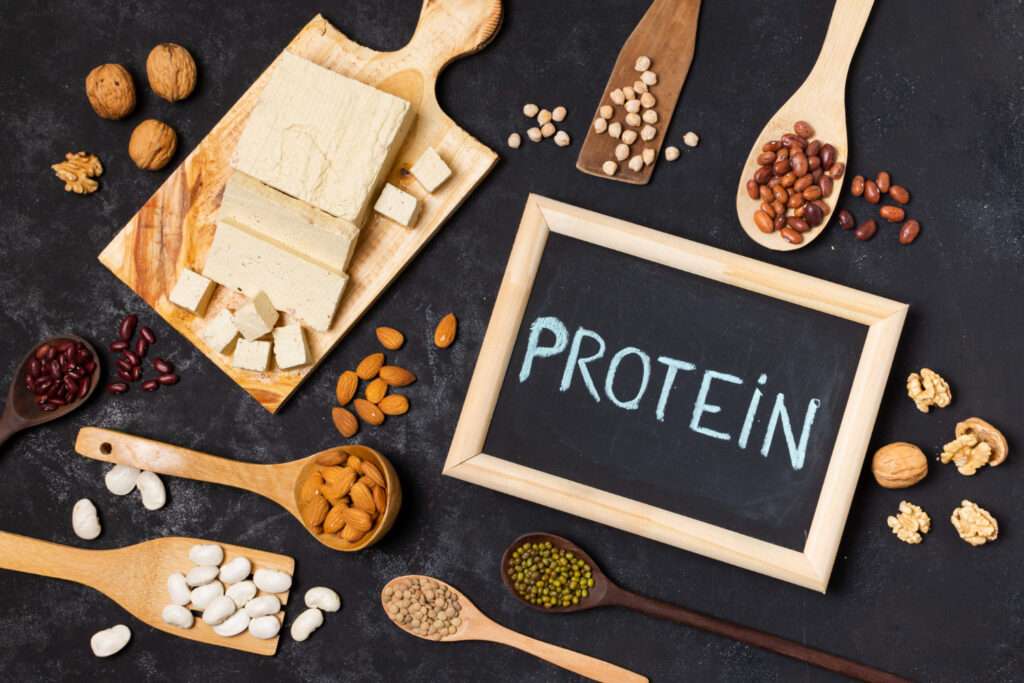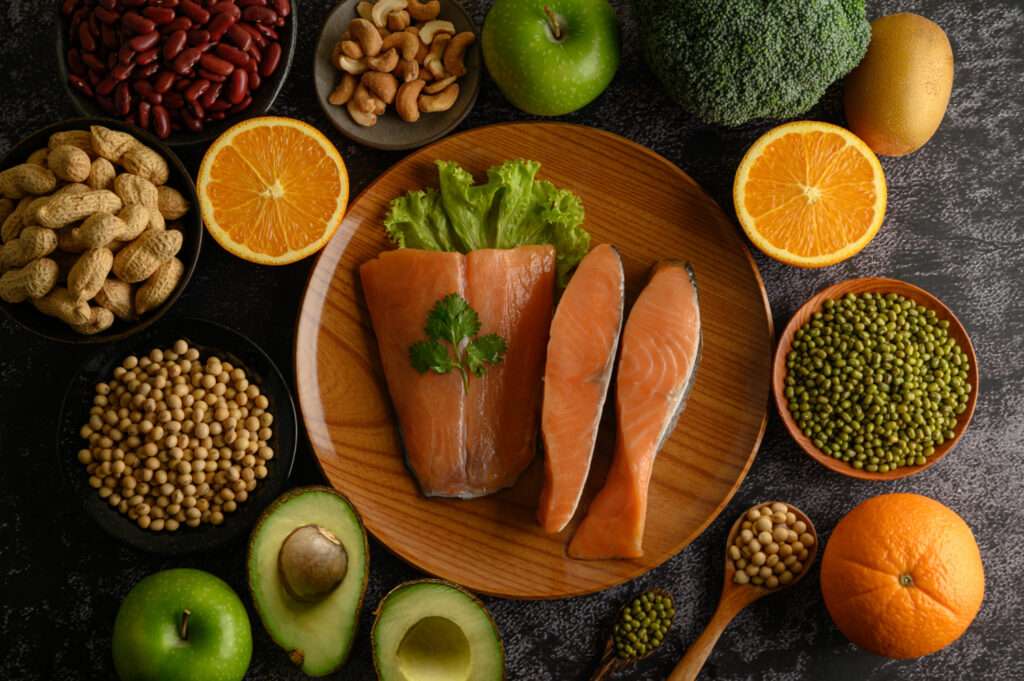Table of Contents

Eating the right foods is super important for doing sports well and recovering properly. Imagine there are three main types of foods your body needs: carbs, protein, and fat.
In this article, we will discuss the appropriate amounts of each macronutrients required, depending on the type of exercise you engage in. Whether you prefer running, weightlifting, or a combination of both, understanding your body’s unique needs is the key to optimizing performance and experiencing post-workout satisfaction.
What Are Macronutrients?
Macronutrients are the essential components of our diet, providing the energy and raw materials necessary for the body’s myriad functions. Here’s a breakdown of the three main macronutrients:
Protein:

Role:
- Fundamental Building Blocks: Proteins serve as the building blocks of tissues, muscles, enzymes, and hormones.
- Tissue Repair and Growth: Crucial for repairing damaged tissues and promoting muscle growth.
- Immune Function: Plays a vital role in immune function and the production of antibodies.
Sources:
- Animal Products: Meat, poultry, fish, eggs, and dairy products.
- Plant-Based Sources: Legumes, tofu, tempeh, quinoa, and certain grains.
Function:
- Muscle Support: Aids in muscle repair and growth, making it essential for athletes and individuals engaging in strength training.
- Enzyme Activity: Facilitates enzymatic reactions necessary for various physiological processes.
Carbohydrates:

Role:
- Primary Energy Source: Carbohydrates are the body’s primary source of energy, especially crucial for high-intensity and endurance activities.
- Brain Fuel: The brain relies on glucose, derived from carbs, for optimal function.
Sources:
- Whole Grains: Brown rice, quinoa, oats, and whole wheat products.
- Fruits and Vegetables: Rich sources of vitamins, minerals, and fiber.
Function:
- Immediate Energy: Carbs are quickly converted into glucose, providing immediate energy for physical activities.
- Fiber Content: Complex carbs with fiber support digestion, regulate blood sugar, and promote a feeling of fullness.
Fats:

Role:
- Secondary Energy Source: Fats serve as a secondary energy source, particularly during low to moderate-intensity activities.
- Cell Structure: Essential for maintaining cell membranes and the structure of cells throughout the body.
Sources:
- Healthy Plant-Based Fats: Avocados, nuts, seeds, and olive oil.
- Fatty Fish: Salmon, mackerel, and trout provide omega-3 fatty acids.
Function:
- Sustained Energy: Fats provide sustained energy and play a crucial role in supporting endurance.
- Vitamin Absorption: Necessary for the absorption of fat-soluble vitamins (A, D, E, K).
Considerations for Balance:
Whole Food Emphasis: Prioritize whole, unprocessed sources of protein, carbs, and fats for a comprehensive nutrient intake.
Individualized Needs: Tailor macronutrient ratios based on individual factors like activity level, age, and specific health goals.
Understanding the intricate roles of protein, carbohydrates, and fats allows for a nuanced and balanced approach to nutrition, supporting not only immediate energy needs but also long-term health and performance goals.
Macronutrients For Different Exercise
1. Endurance Exercise:
Endurance exercises, such as long-distance running, cycling, or swimming, put substantial demands on the body’s energy systems. Proper macronutrients intake is vital for sustaining energy, promoting recovery, and preventing fatigue. Let’s delve into the detailed role of each macronutrients:

Carbohydrates:
- Why: Carbohydrates are the primary fuel for endurance activities, providing readily available energy.
- How: Consuming complex carbohydrates, like whole grains and fruits, ensures a sustained release of glucose, maintaining energy levels during prolonged exercise.
Protein:
- Why: Endurance exercise can lead to muscle breakdown; protein is crucial for repair and recovery.
- How: Adequate protein intake, sourced from lean meats, legumes, and dairy, supports muscle tissue repair, reducing the risk of injury and enhancing overall recovery.
Fats:
- Why: While carbs are primary, fats serve as a secondary, more sustainable energy source during extended activities.
- How: Incorporating healthy fats, such as those found in nuts, seeds, and avocados, provides a source of prolonged energy, especially in the later stages of endurance exercises.
Hydration:
- Why: Endurance activities lead to fluid loss through sweat, impacting performance and recovery.
- How: Staying adequately hydrated by consuming water or electrolyte-rich beverages is crucial for maintaining performance and preventing dehydration-related issues.
Balancing these macronutrients ensures a comprehensive approach to meet the energy demands of endurance exercise, supporting optimal performance and fostering efficient recovery. Customizing intake based on individual preferences, intensity, and duration of exercise enhances the effectiveness of this nutritional strategy.
2. Strength Training:
Engaging in strength training, which involves resistance exercises like weightlifting, demands a specific nutritional strategy to support muscle growth, recovery, and sustained energy. Here’s a detailed breakdown of macronutrients needs:

Protein:
- Why: Protein is the cornerstone for muscle building and repair, crucial for strength gains.
- How: Aim for protein-rich foods like lean meats, eggs, and dairy to provide the amino acids necessary for muscle recovery and growth.
Carbohydrates:
- Why: Carbs fuel high-intensity strength workouts, providing the energy needed for powerful lifts.
- How: Incorporate complex carbs such as whole grains and fruits to ensure a steady release of glucose, supporting sustained strength efforts.
Fats:
- Why: Healthy fats contribute to sustained energy and support hormone regulation critical for strength training.
- How: Include sources like avocados, nuts, and olive oil for a balanced intake of essential fatty acids.
Hydration:
- Why: Fluid balance is crucial for strength training, as dehydration can lead to decreased performance and increased risk of injury.
- How: Prioritize staying well-hydrated by drinking water throughout your strength workouts.
Timing Matters – Pre and Post-Workout Nutrition:
- Why: Consuming nutrients around your strength workout enhances performance and recovery.
- How: Have a balanced meal containing protein and carbs before and after your workout to optimize nutrient availability during the critical phases of exercise.
By aligning your macronutrients intake with the demands of strength training, you provide your body with the necessary tools for muscle growth, sustained energy, and effective recovery. Tailoring this approach to your individual needs and workout intensity enhances the overall effectiveness of your strength training regimen.
3. High-Intensity Interval Training (HIIT):
High-Intensity Interval Training (HIIT) is a dynamic workout style characterized by short bursts of intense exercise followed by brief recovery periods. Tailoring your nutrition to the demands of HIIT is crucial for optimizing performance and recovery. Here’s a comprehensive look at macronutrients needs:

Carbohydrates:
- Why: Carbs are the primary energy source for intense bursts of activity in HIIT.
- How: Consume easily digestible carbs, like fruits or whole grains, before a HIIT session for quick energy release.
Protein:
- Why: HIIT sessions can induce muscle breakdown; protein aids in repair and recovery.
- How: Include protein-rich foods post-HIIT, such as lean meats or protein shakes, to support muscle recovery.
Fats:
- Why: While carbs dominate, fats serve as a secondary, longer-lasting energy source during extended HIIT sessions.
- How: Incorporate healthy fats, like avocados or nuts, into your overall diet to contribute to sustained energy.
Hydration:
- Why: Sweating during HIIT leads to fluid loss; maintaining hydration is vital for sustained performance.
- How: Drink water before, during, and after HIIT to prevent dehydration and support overall performance.
By aligning your macronutrients intake with the demands of HIIT, you enhance your body’s ability to generate energy, facilitate recovery, and maximize the benefits of this intense training style. Customizing nutrition based on individual preferences and the specific nature of HIIT workouts contributes to overall effectiveness and fitness gains.
Workout Supplements
In the world of fitness, workout supplements promise to boost performance, aid recovery, and sculpt your dream physique. But before you stock up, let’s uncover the truth behind the hype surrounding four popular supplements: protein powder, pre-workout drinks, creatine, and fat burners.
Protein Powder:
- Benefits: Protein powder claims to turbocharge muscle growth and recovery, making it a gym-goer’s best friend.
- Scientific Evidence: Research supports its muscle-building prowess, especially for those needing extra protein. However, whole foods can provide similar benefits.
- Drawbacks: Overdoing it may upset your stomach, and relying solely on shakes can deprive you of the nutrients found in whole foods.
Pre-Workout Drinks:
- Benefits: Pre-workout drinks promise an energy boost to power through tough sessions, thanks to ingredients like caffeine and amino acids.
- Scientific Evidence: While caffeine can enhance performance, results vary among individuals. Some studies suggest these drinks may be more about marketing hype than real gains.
- Drawbacks: Side effects like jitters and disrupted sleep are common. Plus, depending on drinks for energy neglects the sustained fuel whole foods provide.
Creatine:
- Benefits: Creatine is hailed for its ability to amplify strength and muscle gains, making it a go-to for many weightlifters.
- Scientific Evidence: Backed by solid research, creatine is proven to enhance performance, particularly in strength training. It’s one of the few supplements with substantial scientific support.
- Drawbacks: While generally safe, some users report stomach discomfort. Still, whole foods should be your main source of creatine.
Fat Burners:
- Benefits: Fat burners claim to rev up metabolism and torch fat, promising a leaner physique.
- Scientific Evidence: Evidence supporting fat burners is shaky at best, with studies showing mixed results. Many rely on stimulants like caffeine, which can have short-term effects on metabolism.
- Drawbacks: Potential side effects like increased heart rate and digestive issues are common. Plus, they’re no substitute for a balanced diet rich in whole foods.
Conclusion:
Understanding macronutrients needs based on exercise types is key for a successful fitness journey. Carbs fuel endurance, protein aids strength, and fats offer sustained energy. Prioritize whole foods over supplements, as they provide a comprehensive range of nutrients.
For personalized guidance, consult a registered dietitian or sports nutritionist to create a tailored macronutrients-rich plan. Achieving fitness goals is a holistic process; it’s about nourishing your body with the right balance of macronutrients from whole foods for lasting health and performance.
FAQs:
1. Why are macronutrients important for fitness?
Macronutrients, including carbs, protein, and fats, are essential for fueling different exercise types. Carbs provide energy, protein supports muscle growth, and fats offer sustained fuel. Balancing these nutrients optimizes performance and aids recovery.
2. Can’t I get all the nutrients I need from regular meals?
While whole foods provide a rich source of macronutrients, supplements may be considered based on individual needs. However, prioritizing a diverse and balanced diet is crucial for obtaining a spectrum of nutrients that supplements may lack.
3. Why not rely solely on supplements for fitness goals?
Supplements can be part of a fitness plan, but they should complement, not replace, whole foods. Whole foods offer a holistic blend of nutrients, fibers, and antioxidants crucial for long-term health and fitness success.
4. How do I know if I need a personalized nutrition plan?
Seeking guidance from a registered dietitian or sports nutritionist is beneficial for tailored advice. They assess individual needs, preferences, and goals to create a personalized macronutrient-rich plan, optimizing your fitness journey.

Pingback: Top 5 Natural Ways To Digest Food Faster |
Pingback: What Is Zone 2 Cardio? The Ultimate Training You're Probably Missing |